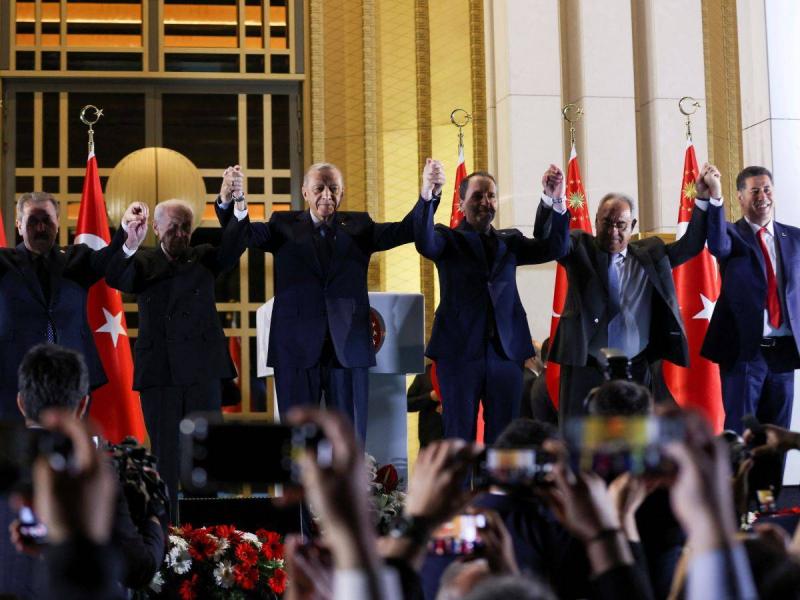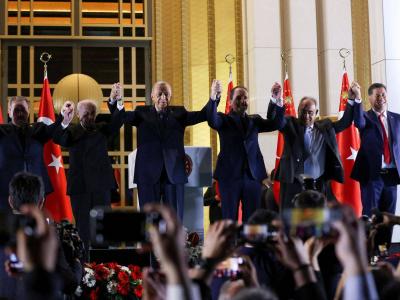Recently, Turkey has changed its diplomatic approach towards Syria for reasons including the attempt to achieve the goal of securing the return of refugees. It has followed the lead of other governments in the region by reopening channels of communication with President Bashar al-Assad, whom Erdoğan had previously described as a "butcher."
Turkish President Recep Tayyip Erdoğan has highlighted his plans to return one million Syrian refugees to their homeland at a time when he is trying to appeal to nationalist sentiments to reach the third decade of his rule. However, he may face significant challenges in fulfilling this promise as the conflict in Syria continues. Erdoğan, who has long been considered by some Syrian opponents of Assad as an ally, emphasized the return of refugees during a fierce election campaign before the runoff held on Sunday against Kemal Kılıçdaroğlu, who took a tougher stance on this issue. Focusing on the return of the refugees ahead of the elections sparked concern among the nearly 3.4 million Syrians living in Turkey, where there is increasing resentment towards them. Many refugees come from areas in Syria still under Assad's control and say they cannot return to their towns and villages as long as he remains in power.
According to Erdoğan’s plans, they will not have to return to these areas as he claims that Turkey is building new housing in northwestern Syria, which is controlled by armed opposition groups—an area where Ankara has deployed ground forces that have deterred the Syrian government from launching attacks. These plans indicate a doubling of Turkey's commitment to the region controlled by armed groups, as it increases its influence there after years, even as Assad demands a timeline for the withdrawal of Turkish forces as a condition for improving relations between the two countries.
With growing dissatisfaction among Turkish voters regarding the situation—since Turkey hosts more refugees than any other country—Erdoğan placed the issue of refugees at the center of his policy towards Syria alongside concerns regarding Syrian Kurdish groups that have established footholds along the border and are considered a threat to Turkey's national security. Erdoğan stated that his goal is to ensure the return of one million refugees within a year to areas controlled by the opposition. Last week, his Interior Minister Süleyman Soylu attended the inauguration of a housing project in the Syrian town of Jarablus aimed at accommodating some of those returning.
In his victory speech on Sunday, Erdoğan said, "It is our duty to meet our citizens' expectations regarding this issue in ways befitting our country," adding that nearly 600,000 Syrians have already voluntarily returned to safe areas. However, for many Syrians in Turkey, this prospect is unappealing. A Syrian named Ahmad (28), a student at Ankara University, said, "I would like to return to Syria, but not to Jarablus... I would like to return to my place in my country... to Latakia," referring to the government-controlled area overlooking the Mediterranean. He added, "I would like to return... but if Assad remains, I cannot due to security concerns."
Due to control by many armed groups, areas of northwestern Syria also suffer from lawlessness. Aaron Lund, a Syrian affairs expert at the Century International, a research organization, stated, "Conditions in northern Syria remain extremely poor and unstable, making it difficult to arrange a large-scale return despite all these reports about Turkey and Qatar building housing and infrastructure." He added, "It feels like a drop in the ocean, and the overall economic situation is deteriorating."
Turkey has altered its diplomatic approach towards Syria for the aim of ensuring the return of refugees. It has followed other governments in the region by reopening communication channels with Assad, whom Erdoğan had previously labeled a "butcher." However, Ankara's rapprochement with Damascus is moving at a slower pace compared to the improving relations between Assad and Arab countries, reflecting Turkey's deeper role in a country where Russian, Iranian, and U.S. forces are also present.
Many analysts believe that Ankara will not easily comply with Assad’s demand for a withdrawal timeline, indicating that any sign of Turkish forces leaving would drive more Syrians to flee to Turkey for fear of a return to Assad's rule in the northwest. Darine Khalifa from the International Crisis Group stated, "It is extremely unlikely that Turkey will agree to withdraw its forces, which likely means that hundreds of thousands of refugees will head to Turkey if its forces leave Idlib."
Many Syrians in Turkey felt relieved by Kılıçdaroğlu's defeat. During his campaign, he stated that he would discuss plans for the return of refugees with Assad after restoring relations and that their return would be completed within two years, but would not be forced. He sharpened his tone after receiving fewer votes than Erdoğan in the first round, pledging to return all migrants to their countries.
Ibrahim Kalin, Erdoğan's chief foreign policy advisor, stated on Monday that Turkey seeks a safe, dignified, and voluntary return. International refugee law stipulates that all returns must be voluntary. Kalin told a local radio station, "We plan to secure the return of one million or 1.5 million Syrians primarily." Samir Abdallah from the Harmony Center for Contemporary Studies in Istanbul, a non-profit research institution, said he does not expect much change now that the election battle is over. He stated, "Syrians are relieved after Erdoğan's victory... There is nothing wrong with voluntary return. We do not expect a change in immigration policy."




